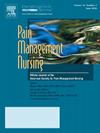Barriers to Pediatric Postoperative Pain Management—Interprofessional Focus Group Interviews
IF 1.6
4区 医学
Q2 NURSING
引用次数: 0
Abstract
Background
Historically, postoperative pain management of children in hospitals has been inadequate, despite advancements in pain physiology and management. Postoperative pain correlates with increased complications, psychological harm, and parental stress, leading to inefficiencies in resource utilization and prolonged hospital stays. Effective pain management relies on organizational, collaborative, and individual efforts, with interprofessional communication and cooperation being crucial.
Aim
This study aims to explore healthcare professionals’ experiences with barriers to effective pediatric postoperative pain management through interprofessional focus group interviews, aiming to address gaps in understanding and improve care.
Methods
Data collection was performed using focus group interviews with twelve healthcare professionals from four surgical wards. Interviews were audio-recorded and transcribed verbatim. Transcriptions were coded and analyzed using reflexive thematic analysis by two researchers independently.
Results
Our study aligns with prior research on barriers, revealing issues such as lack of competence among physicians and nurses, limited availability of skilled personnel, heavy workloads, and absence of standardized protocols. These barriers largely reflect resource limitations and resonate with existing literature. Additionally, our findings highlight differences in perceptions between nurses and physicians regarding opioid use and standardized pain assessment tools, underscoring potential barriers to optimal pediatric postoperative pain management.
Conclusions
Our study underscores the importance of adhering to standardized, evidence-based pain management protocols, revealing a link to inadequate leadership at the hospital and department levels. Noncompliance may stem from professional inexperience and lack of trust between healthcare professionals, necessitating interprofessional dialogues facilitated by leaders to foster a culture of evidence-based pediatric care.
Clinical Implications
Establishing best practices and ensuring adherence is a leadership responsibility. Furthermore, a lack of adherence to established routines of pain management might be a consequence of professional inexperience and lack of competence, as well as a symptom of lack of trust between professions and professionals. It is important that leaders of both nurses and physicians facilitate arenas for discussing these topics. A culture of evidence-based PPPM needs to be interprofessional and inclusive of different perspectives and facilitate open discussions.
儿科术后疼痛管理的障碍:跨专业焦点小组访谈。
背景:从历史上看,尽管在疼痛生理学和管理方面取得了进展,但医院对儿童术后疼痛的管理一直不足。术后疼痛与并发症增加、心理伤害和父母压力相关,导致资源利用效率低下和住院时间延长。有效的疼痛管理依赖于组织、协作和个人的努力,专业间的沟通和合作是至关重要的。目的:本研究旨在通过跨专业焦点小组访谈,探讨医疗保健专业人员在有效的儿科术后疼痛管理方面的经验障碍,旨在解决理解和改善护理方面的差距。方法:采用焦点小组访谈法对来自4个外科病房的12名医护人员进行资料收集。采访录音并逐字抄写。转录编码和分析使用反身主题分析由两位研究者独立。结果:我们的研究与先前关于障碍的研究一致,揭示了诸如医生和护士缺乏能力、技术人员有限、工作量大、缺乏标准化协议等问题。这些障碍很大程度上反映了资源的限制,并与现有文献产生了共鸣。此外,我们的研究结果强调了护士和医生对阿片类药物使用和标准化疼痛评估工具的看法差异,强调了最佳儿科术后疼痛管理的潜在障碍。结论:我们的研究强调了坚持标准化、循证疼痛管理协议的重要性,揭示了医院和科室层面领导不足的联系。不合规可能源于专业经验不足和医疗保健专业人员之间缺乏信任,因此需要由领导者推动的专业间对话,以培养循证儿科护理文化。临床意义:建立最佳实践并确保遵守是领导的责任。此外,缺乏对既定疼痛管理常规的坚持可能是专业人员缺乏经验和能力的结果,也是专业人员和专业人员之间缺乏信任的症状。重要的是,护士和医生的领导促进讨论这些话题的舞台。以证据为基础的公私合营文化需要跨专业、包容不同观点,并促进公开讨论。
本文章由计算机程序翻译,如有差异,请以英文原文为准。
求助全文
约1分钟内获得全文
求助全文
来源期刊

Pain Management Nursing
医学-护理
CiteScore
3.00
自引率
5.90%
发文量
187
审稿时长
>12 weeks
期刊介绍:
This peer-reviewed journal offers a unique focus on the realm of pain management as it applies to nursing. Original and review articles from experts in the field offer key insights in the areas of clinical practice, advocacy, education, administration, and research. Additional features include practice guidelines and pharmacology updates.
 求助内容:
求助内容: 应助结果提醒方式:
应助结果提醒方式:


